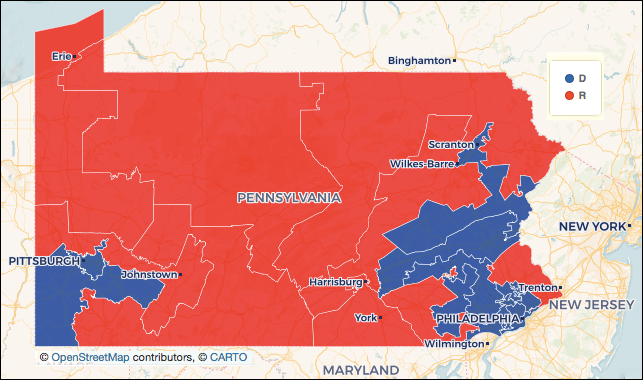By Jim Ellis — Tuesday, July 11, 2023
Senate
Maryland: Rep. Raskin Won’t Run for Senate — Saying, “if these were normal times, I’m pretty sure I would run for the Senate,” Rep. Jamie Raskin (D-Takoma Park) said he will not enter the race to succeed retiring Maryland Sen. Ben Cardin (D). The congressman, as he has in the past, continued to thank the medical personnel who helped him through six rounds of five-day chemotherapy treatments that appears to have eradicated his cancer. Raskin further said he can best way he can “make a difference in American politics,” is to seek re-election to the US House. He will be a prohibitive favorite to win a fifth term next year.Virginia: Ex-Congressional Candidate Announces for Senate — Retired Navy Capt. Hung Cao (R), who held Rep. Jennifer Weston (D-Leesburg) to a 53-47 percent re-election win in a district that the FiveThirtyEight data organization rates as D+8 and the Dave’s Redistricting App partisan lean projects a 55.2D – 43.0R Democratic advantage, will now attempt to challenge Sen. Tim Kaine (D).
Cao faces eight announced opponents in the Republican primary but will likely be favored to win the party nomination. He will be a clear underdog against Sen. Kaine, but Cao will give the Republicans a credible nominee and potentially a candidate who can forge bridges into the state’s substantial Asian community. The demographic now accounts for 8.2 percent of the statewide population, but almost 16 percent in the Northern Virginia region, where Republicans don’t fare well.
House
CA-34: Rep. Gomez Rival Returns for Third Race — Largely because there is no inter-party political drama in California’s 34th Congressional District located wholly within Los Angeles County that contains a large portion of downtown LA, the two close races between Rep. Jimmy Gomez (D-Los Angeles) and former prosecutor David Kim (D) have generated little publicity. In 2020, Rep. Gomez defeated Kim, 53-47 percent in the first of their two double-Democratic general elections. In 2022, the congressman’s margin dropped to 51-49 percent. On Friday, Kim announced that he will return for a third run.
The FiveThirtyEight data organization rates CA-34 as D+63, and President Joe Biden defeated former President Donald Trump here, 81-17 percent. The district is almost 88 percent minority. The Hispanic segment accounts for 61.6 percent of the population, while Asians comprise 20.4 percent. Expect this race to again be close and Kim must be considered a significant challenger candidate.
New Mexico: State Supreme Court Allows Republican Lawsuit to Proceed — The New Mexico Supreme Court ruled unanimously at the end of last week that the Republicans’ political gerrymandering lawsuit can move forward against the state. Reflecting upon the US Supreme Court’s recent ruling on the North Carolina judicial role in redistricting, the state high court is in much stronger position to review the 2021 congressional and state legislative maps as political gerrymanders. For example, the congressional plan eliminated the state’s lone Republican seat in the current draw.
Whether the map will be invalidated is yet to be determined, but the high court agreed that the case has merit to continue.
PA-7: New Challenger Emerging — In the past two elections in the Allentown-Bethlehem-Easton 7th District of Pennsylvania, Rep. Susan Wild (D-Allentown) has won two 51-49 percent victories over former Lehigh County Commissioner and businesswoman Lisa Scheller (R). On Friday, a new candidate, Pennsylvania Convention Center director and DeSales University trustee Maria Montero (R), filed a congressional campaign committee with the Federal Election Commission.
While Scheller is not expected to return for a third run, Montero is likely to have Republican primary competition. Technology firm owner and 2022 congressional candidate Kevin Dellicker, who held Scheller to only a 51-49 percent GOP primary victory, is expected to again surface as a candidate. State Rep. Ryan MacKenzie (R-Macungie) is another potential participant.
The 7th District general election should again be highly competitive. The FiveThirtyEight data organization rates the seat as R+4, but Dave’s Redistricting App calculates the partisan lean in the Democrats’ favor, 50.4D – 47.4R.
UT-2: Two File Special Election Petition Signatures — After the Utah 2nd District Republican endorsing convention chose congressional legal counsel Celeste Maloy to replace her boss, Rep. Chris Stewart (R-Farmington), most contenders from the large field ended their Sept. 5 special primary election campaigns.
Two, however, are moving forward. Former state Rep. Becky Edwards and ex-Republican National Committeeman Bruce Hough were the only two who submitted petition signatures in an attempt to qualify for the special primary ballot. It remains to be seen if there are 7,000 valid 2nd District registered voter signatures from each of their submissions.
Assuming the pair qualifies, the three candidates will comprise the primary election field. The winner will advance to a Nov. 21 election against the unopposed Democratic candidate, state Sen. Kathleen Riebe (D-Cottonwood Heights), and any Independent or third party contender who can also qualify for the ballot. Rep. Stewart has announced he will leave office on Sept. 15.





